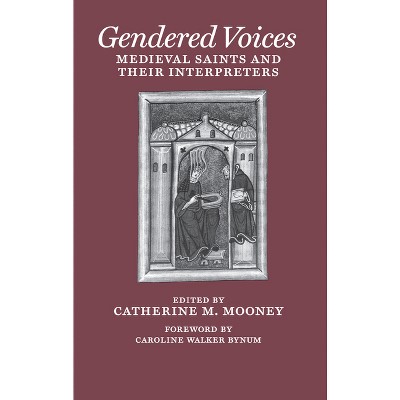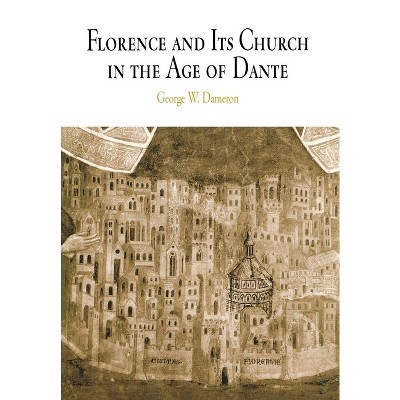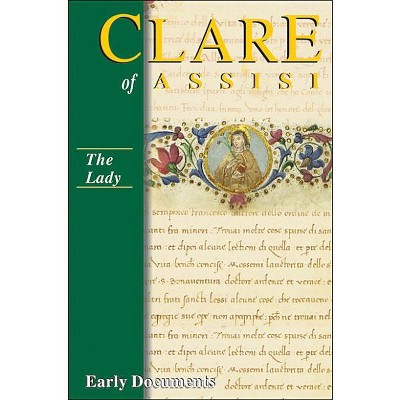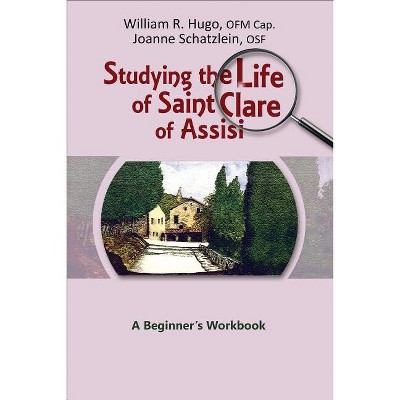Clare of Assisi and the Thirteenth-Century Church - (Middle Ages) by Catherine M Mooney (Hardcover)

About this item
Highlights
- In a work based on a meticulous analysis of sources, many of them previously unexplored, Catherine M. Mooney upends the received account of Clare of Assisi's founding of the Order of San Damiano, or Poor Clares.
- About the Author: Catherine M. Mooney is Associate Professor of Church History at Boston College.
- 312 Pages
- Religion + Beliefs, Christian Church
- Series Name: Middle Ages
Description
About the Book
In a work based on a meticulous analysis of sources, many of them previously unexplored, Catherine M. Mooney upends the received account of Clare of Assisi's founding of the Order of San Damiano, or Poor Clares.Book Synopsis
In a work based on a meticulous analysis of sources, many of them previously unexplored, Catherine M. Mooney upends the received account of Clare of Assisi's founding of the Order of San Damiano, or Poor Clares. Mooney offers instead a stark counternarrative: Clare, her sisters of San Damiano, and their allies struggled against a papal program bent on regimenting, enriching, and enclosing religious women in the thirteenth century, a program that proved largely successful.
Mooney demonstrates that Clare (1194-1253) established a single community that was soon cajoled, perhaps even coerced, into joining an order previously founded by the papacy. Artfully renaming it after Clare's San Damiano with Clare as its putative mother, Pope Gregory IX enhanced his order's cachet by associating it also with Clare's famous friend, Francis of Assisi. Mooney traces how Clare and her allies in other houses attempted to follow Francis's directives rather than the pope's, divested themselves of property against the pope's orders, and organized in an attempt to change papal rule; and she shows how, after Francis's death, the women's relationships with the Franciscans themselves grew similarly fraught. Clare's pursuit of her vision proved relentless: at the time of her death, she newly identified her community as the Order of Poor Sisters and allied it unambiguously with Francis and his friars.
Overturning another myth, Mooney reveals how only in the late nineteenth century did Clare come to be known as the sole author of a rule she had written collaboratively with others. Throughout, the story of Clare and her sisters emerges as a chapter in the long history of women who tried to define their religious identities within a Church more committed to unity and conformity than to diversity and difference.
Review Quotes
"Clare of Assisi and the Thirteenth-Century Church is a great gift to contemporary women religious, whether Franciscan or not. Too much of our actual history is smothered in the political wranglings of the clerical world and misrepresented by scholars who don't ask biting questions (when will we stop confusing enforced conformity with reform?) but perpetuate tired old stories about our foremothers. This is the kind of thoughtful research we need from scholars today"-- "Magidtra"
""Mooney's work is compelling and is an important contribution to Franciscan scholarship. As she demonstrates, penitential communities were diverse in the thirteenth century. However, Mooney also emphasizes that common among them was their insistence upon determining their own form of life amid interference from ecclesiastic authorities that sought to regularize them. Therefore, beyond the study of Clare and the penitential movement in Italy, the monograph also raises questions about the experiences of female penitential communities in other regions in medieval Europe, such as the Low Countries and France."-- "Medieval Feminist Forum"
"[A] superb book about Clare of Assisi and the 1253 rule for mendicant women attributed to her. She shows herself to be a sympathetic reader of Clare's life and writings. Catherine M. Mooney is also a historian with the audacity to challenge received readings and provide readers with a 'new narrative'...[A]n exemplary publication that provides a model of good scholarship and a firm understanding of an important figure."-- "The Historian"
"[N]ot a traditional biography, Mooney's careful reading of the sources-about Clare herself, the origins of the Order of San Damiano, and the papacy's steadfast attempts to impose greater standardization and enclosure on female religious communities during the early thirteenth century-reveal a woman who was firmly committed to her faith, and determined to resist any attempts to prevent her from fulfilling her understanding of her vocation. Mooney scrutinizes a variety of sources-letters, papal documents, vitae, religious rules, and canonization testimonies-in order to better contextualize Clare and her contemporaries."-- "Speculum"
"Catherine M. Mooney's study is researched, well-written, and responsibly balanced--an indispensable guide enabling a reader to navigate this turning point of the religious life of women."-- "Church History"
"Catherine Mooney has provided not only an invaluable handbook for the study of the Clarist rules but also a thought-provoking reappraisal of the traditional portrait of St Clare and the origins of the order that bears her name."-- "Parergon"
"In this impressive display of scholarship, Catherine Mooney exposes some long-standing myths about Clare of Assisi and the historical context in which Clare lived, not only broadening the documentary sphere in which the lives of Clare and her sisters in religion are viewed, but also rethinking what the results of this increased scope mean."-- "Renaissance Quarterly"
"Mooney's book accomplishes a rare feat: it is both a vital contribution to the study of Clare of Assisi and the religious worlds of which she is a part and an accessible case study of how the best and most careful work of historical scholarship in the study of religion is undertaken."-- "Journal of the American Academy of Religion"
"This book is absolutely needed for its depiction of Clare not as a woman destined to be the founder of the Order of San Damiano but as a woman caught in the middle of a struggle between the papacy and the larger grassroots reform movement of the vita apostolica."-- "Carolyn Muessig, University of Bristol"
"What makes Mooney's book commendable is her meticulous scrutiny of the contemporary sources and the close reading of legal texts, chronicles, letters and the acts of the saint's canonisation which result in a well-founded and reliable representation of Clare's guidance of and her struggles for the religious life in San Damiano in the footsteps of St Francis and the Lesser Brothers."-- "Journal of Ecclesiasticl History"
About the Author
Catherine M. Mooney is Associate Professor of Church History at Boston College. She is editor of Gendered Voices: Medieval Saints and Their Interpreters, also available from the University of Pennsylvania Press.










